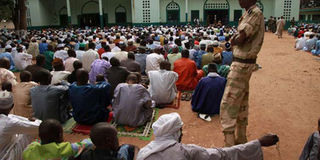Chaos reigns as AU Kigali summit looks for new head

A soldier from the Central African Republic Army stands guard as Muslims gather at the PK5 Mosque in Bangui on July 6, 2016, for Eid al-Fitr, which marks the end of the holy month of Ramadhan. PHOTO | EDOUARD DROPSY | AFP
What you need to know:
- African Union Commission's deputy chairperson will be elected at meeting.
- Eight commissioners will be elected, some for their final terms.
- Unfortunately, amid the pomp and pageantry, there are disturbing developments on the continent that cannot be wished away.
The 27th Ordinary Session of the Assembly of the African Union that will open in Kigali, Rwanda will culminate in South African stateswoman Nkosazana Dlamini-Zuma’s exit as chairperson of the African Union Commission (AUC).
The meeting will have varied agenda, including the election of Dlamini-Zuma’s successor. It will also see the election of the commission’s deputy chairperson.
Eight commissioners will be elected, some for their final terms. Unfortunately, amid the pomp and pageantry, there are disturbing developments on the continent that cannot be wished away.
Among the most alarming is the turmoil in fragile lands like Burundi, DR Congo, Central African Republic as well as what is unfolding in South Sudan. A cloud of mystery hangs over the situation in the latter country, where shooting has been reported near the presidential palace.
The Kigali meeting, whose theme is “2016: African Year of Human Rights, with particular focus on the Rights of Women”, will be held on the backdrop of spirited protests in Zimbabwe.
Ironically for Zimbabwe, where the future of the regime remains uncertain, the Western powers the beleaguered government is looking up to are the same ones President Mugabe has made a career thumbing his nose at.
If past AU elections are anything to go by, intense lobbying is likely to continue until the polls are held during next weekend’s assembly of heads of state and government.
SECRET BALLOT
The election of the AU Commission chairperson is held by secret ballot, followed by that of his or her deputy. After that, the assembly is expected to endorse the nomination of commissioners earlier elected by the executive council, made up of foreign ministers.
Jostling for the prestigious post of the AUC boss has entailed vigorous behind-the-scenes diplomatic activities in the five continental regions.
The regions designated by the AU are Southern Africa, made up of 10 countries, Central Africa with nine and Eastern Africa with 14. West Africa has 14 countries while Northern Africa is made up of six.
Equal regional and gender representation in the administrative agency are major requirements. Candidates have to be elected by a two-thirds majority.
Provisions call for two commissioners from each of the regions, with at least one member from every region being a woman. There is, however, a condition that the chairperson and his or her deputy cannot be from the same region, and that their regions will only have one more commissioner.
Several candidates have offered themselves for the deputy chairperson’s position. They include Yacin Elmi Bouh of Djibouti, Somalia’s Ibrahim Ali Hussein, Thomas Kwesi Quartey of Ghana and Emmanuel Djomatchoua of Cameroon.
Frontrunners for chairmanship include Uganda’s former vice-president Specioza Wandira Kazibwe. She will battle it out with Equatorial Guinea’s Agapito Mba Mokuy and Botswana’s Pelonomi Venson-Moitoi, 65.
Even more interesting, there has been talk of former Tanzanian President Jakaya Kikwete joining the chairperson’s race despite not having thrown in his hat by the April deadline.





